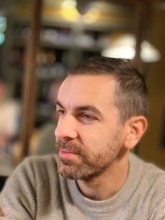Member Story: Gordon Rogers FICRS - Head of Sustainability, Yorkshire Water
How did you get into CRS, and why did you choose this profession?
For as long as I can remember, I’ve had a personal passion for nature and a fair society. This shaped my choice of A Levels and then my degree; choosing Environmental Science. After graduation I took a two-week temp job at Yorkshire Water. I didn’t have the water industry front of mind when thinking about companies and sectors I wanted to try and work for after graduating; but luckily for me there was a natural fit as it’s one of those sectors that works with, and relies on, the environment 24/7 and connects with every person they serve. My temp roles eventually led to my first permanent environmental job, and one role led to another! Nearly 20 years on and now leading a sustainability function, I still find myself fascinated and constantly learning as organisations and society take sustainability issues more seriously. CRS roles are having increasing impact due to the growing recognition for the importance of ‘responsible business’, moving far beyond the old compliance focus. Good news for all of us focussed in this area.
Describe a typical day in your current role
Every day is different and that is part of what I love about it. There are some themes: a big focus is engaging with others, both within, and externally to the company. Seeking out opportunities, to explore and develop ideas and projects that will help drive the agenda. Learning and collaborating with other leaders, and promoting our own areas of leadership to help inform wider progress. I also provide my expertise, and mentor and challenge others, to ensure responsible business and sustainability is understood and progressed. I spend a lot of my time bringing clarity, structure and governance to help embed and mature sustainability ideas and activities to ensure they become real and lasting; and to deliver tangible benefits. And finally I enjoy supporting my team and helping them learn, develop and grow into exceptional sustainability professionals.
What are your favourite and least favourite parts of your role?
I am motivated by seeing something change for the better, normally after lots of hard work and a bit of luck jumping on opportunities where they come. I love finding innovative ways to overcome obstacles. It’s really great when this comes from work directly led by my team and I, but it’s even more rewarding when it comes through others because that’s the sign that behaviours and culture are changing more widely. The most frustrating part is when I just can’t get traction on something that I know is good, but for whatever reason I can’t articulate my case or others aren’t in the right place to listen or take action. Taking the long view though, I often find we sow the seeds of something at one point and it comes back again at the right time down the line. Patience is another valuable skill in CRS and I’m quite happy if others think something is their idea just as long as we get the progress!
Which professional project or achievement are you most proud of?
I introduced the concept of the Six Capitals to Yorkshire Water about five years ago, working closely with the Company’s CFO. I have embedded and matured the Company’s approach ever since. It is now a key pillar of decision making to ensure delivery of more sustainable outcomes within the Company. The Capitals represent the resources on which we all rely and impact. Society has become used to managing and making decisions about financial capital and manufactured capital (built assets), but overlooks a lot of what it takes to develop those – natural, social, human and intellectual capital. I found it really helps to use business and financial language to get traction on sustainability issues. We’re still relatively early in our journey with the Capitals at Yorkshire Water (but still a true leader in this space I think), even after five years, but the Capitals have already reshaped the Company’s strategy, business model, investment choices, and corporate governance, and this is now feeding through into great outcomes for people and planet. My colleagues and I have published our work at www.yorkshirewater.co.uk/capitals
What makes your sector unique from a CRS perspective?
I often think the UK water sector is at the forefront of CRS issues, making it a great place to work if you want to drive change for the better. There are so many interesting dimensions in the water sector that are at the heart of CRS priorities. In the UK we’ve such reliable water services that few question where the water comes from when they turn the tap, or where it goes when they flush the loo. But it’s all about protecting people’s health and the environment: looking out for the vulnerable; encouraging water efficiency; preventing river pollution; managing land catchments to keep sources of water clean and storing rain water to prevent downstream flooding; managing the impacts of using large amounts of energy, chemicals and concrete; generating vast amounts of renewable energy, mostly from human waste(!). And lay over this that climate change is a major issue for a sector so clearly reliant on the weather for its services. There are all sorts of issues for CRS professional to get stuck into, and with its public service ethos, the industry is actively wanting to explore and respond.
What do you think are the most important skills for working in CRS?
A technical understanding helps, but that can be learnt. For me, the bigger key to success in CRS are the softer skills. Because we’re always trying to get others to join us and do things differently, the key skills are influencing, persistence and determination, resilience (skin of a rhinoceros I always think!), creativity and the ability to engage well with others.

